|
|
|
Sort Order |
|
|
|
Items / Page
|
|
|
|
|
|
|
| Srl | Item |
| 1 |
ID:
095309
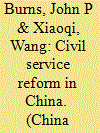

|
|
|
|
|
| Publication |
2010.
|
| Summary/Abstract |
China's civil service reforms sought to improve the performance of civil servants by introducing more competitive selection processes, incentives to reward performance, and tightened monitoring and supervision. The impact of the reforms was undermined by clashes with other policies being implemented at the time and by a failure to address elements of organization culture that have rewarded various forms of illegal behaviour, such as corruption. Empirical material for our study is drawn from government data and the experience of civil service reform in three Chinese urban areas (Beijing's Haidian district, Changchun and Ningbo) since the 1990s.
|
|
|
|
|
|
|
|
|
|
|
|
|
|
|
|
| 2 |
ID:
095318
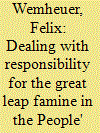

|
|
|
|
|
| Publication |
2010.
|
| Summary/Abstract |
In the aftermath of the famine in 1962, Mao Zedong took formal responsibility for the failure of the Great Leap Forward in the name of the central government. Thousands of local cadres were made scapegoats and were legally punished. This article focuses on the question of how the different levels of the Chinese state, such as the central government, the province and the county, have dealt with the question of responsibility for the famine. The official explanation for the failure of the Great Leap will be compared to unofficial memories of intellectuals, local cadres and villagers. The case study of Henan province shows that local cadres are highly dissatisfied with the official evaluation of responsibility. Villagers bring suffering, starvation and terror into the discourse, but these memories are constructed in a way to preserve village harmony. This article explains why these different discourses about responsibility of the famine are unlinked against the background of the "dual society"; the separation between urban and rural China. Finally, it will be shown that the Communist Party was unable to convince parts of society and the Party to accept the official interpretation.
|
|
|
|
|
|
|
|
|
|
|
|
|
|
|
|
| 3 |
ID:
095317


|
|
|
|
|
| Publication |
2010.
|
| Summary/Abstract |
This study addresses the Chinese Second World War victims' reparations movement (CWRM) against Japan as a case of contemporary Chinese memory politics. While many studies indicate the Chinese government's use of the war memories for political purposes, ours focuses on how official discourses are translated into citizens' political participation and how the state-society interactions lead to variation in the development of the movement sectors within the case of CWRM. Drawing on textual and ethnographic data and a theoretical "dynamic statism," we argue that the central government's ambivalent attitude towards this ideologically useful yet institutionally troublesome movement created room for local governments and the movement to pursue their own causes. Yet the local and central governments' strong interventions, either facilitation or repression, discouraged civil society's participation and led to the underdevelopment of some movement sectors. In the sectors where the local governments held an attitude of absenteeism or co-operation, the movement was able to mobilize resources from civil society and state institutions and finally developed well.
|
|
|
|
|
|
|
|
|
|
|
|
|
|
|
|
| 4 |
ID:
095311
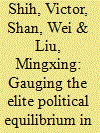

|
|
|
|
|
| Publication |
2010.
|
| Summary/Abstract |
Can one man dominate the Chinese Communist Party? This has been a much debated issue in the field of Chinese politics. Using a novel database that tracks the biographies of all Central Committee (CC) members from 1921 to 2007, we derive a measure of top CCP leaders' factional strength in the CC. We show that Mao could not maintain a commanding presence in the Party elite after the Eighth Party Congress in 1956, although the Party chairman enjoyed a prolonged period of consolidated support in the CC at a time when the CCP faced grave external threats. No Chinese leader, not even Mao himself, could regain the level of influence that he had enjoyed in the late 1940s. Our results, however, do not suggest that a "code of civility" has developed among Chinese leaders. The Cultural Revolution saw the destruction of Liu Shaoqi's faction. Although violent purges ended after the Cultural Revolution, Chinese leaders continued to promote followers into the CC and to remove rivals' followers
|
|
|
|
|
|
|
|
|
|
|
|
|
|
|
|
| 5 |
ID:
095315
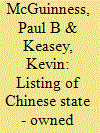

|
|
|
|
|
| Publication |
2010.
|
| Summary/Abstract |
China's leading state-owned banks have undergone radical transformation in recent years, with six of the country's top seven players listed in both Hong Kong and Shanghai. We first consider how the banks were reorganized for initial public offering, in terms of the removal of non-performing loans and the massive recapitalization of their balance sheets. Second, and more importantly, we consider whether they have been able to retain market share, further commercialize and enhance overall financial positions post-listing. Through in-depth case analysis of the six state-owned banks, we show that post-initial public offering they have significantly improved profitability, loan book size, loan book quality and capital reserve protection. However, we caution that the debilitating effects of the global credit crunch may slow or even arrest further progress across these dimensions in the near term. We conclude that China's leading banks have benefited materially from their transition, and have accordingly developed a range of competitive and co-operative strategies not only to sustain domestic market advantage but also to penetrate overseas markets.
|
|
|
|
|
|
|
|
|
|
|
|
|
|
|
|
| 6 |
ID:
095305
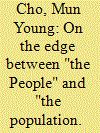

|
|
|
|
|
| Publication |
2010.
|
| Summary/Abstract |
This article examines how local resistance against government attempts to reduce poverty to a technical problem ironically reinforces the precarious state of the poor. It looks at the workings of the minimum livelihood guarantee (dibao) through mundane interactions between street-level officials and poor residents in a workers' village on the periphery of Harbin. As the party-state's primary policy for urban poverty, dibao has introduced a new rationality that poverty is calculable and flexible. Urban laid-off workers have resisted this by invoking the socialist claim that they are "the people." I examine how this resistance has led street-level officials to be preoccupied with the old socialist norm of "an ability to work" rather than with "income" as dibao's official criterion. The new local criterion has produced the ironic effect that urban laid-off workers, who were understood to be dibao's main target, have been mostly excluded from the scheme.
|
|
|
|
|
|
|
|
|
|
|
|
|
|
|
|
| 7 |
ID:
095304


|
|
|
|
|
| Summary/Abstract |
Using nationally representative household survey data and a revealing statistical method, this article investigates the redistributive nature of the Chinese social benefit system within urban and rural areas respectively and in the national context. Like many other dimensions of Chinese society, the redistributive nature of social benefits appeared to be a two-sided story: urban social benefits were much more generous and predominantly progressive, while rural social benefits were minimal and consistently regressive. The national social benefit system was redistributed regressively, but the extent of its regressivity decreased over time, suggesting an equity-oriented policy direction echoed by several recent government initiatives to support rural residents, migrants and the urban poor. The outcomes of these initiatives, especially their redistributive effects, require close observation and await evaluation.
Qin Gao is an assistant professor at Fordham University in New York City. Her current research focuses on the Chinese social benefit system in transition and its impact on poverty, income inequality, and family economic and subjective well-being and cross-national comparative social policy analysis among China, South Korea and Vietnam.
|
|
|
|
|
|
|
|
|
|
|
|
|
|
|
|
| 8 |
ID:
095312


|
|
|
|
|
| Publication |
2010.
|
| Summary/Abstract |
Although the Chinese government has claimed to be pursuing tripartism for labour relations, the non-judicial resolution of interest conflict in enterprises is largely a process of quadripartite interaction. In addition to the government and employers, the trade unions and workers are separate players: labour strikes in China are always launched by unorganized workers rather than by trade unions, whose task is to defuse the situation. Such a quadripartite process is dominated by the government, with the trade union playing a mediating role, not only between workers and the government but also between workers and employers. The process involves certain explicit and implicit rules, as well as distinct dynamics. This research examines the institutional and social basis of quadripartite interaction and how it led to the settlement of strikes. It demonstrates that although it can effectively defuse workers' collective action, a quadripartite process of conflict resolution reflects a low degree of institutionalization of industrial relations in China.
|
|
|
|
|
|
|
|
|
|
|
|
|
|
|
|
| 9 |
ID:
095308


|
|
|
|
|
| Publication |
2010.
|
| Summary/Abstract |
In 2002, the Chinese leadership announced a change in national welfare policy: Voluntary medical schemes at county level, called the "New Rural Co-operative Medical System" should cover all counties by 2010. This article addresses the main characteristics of this system, analyses the introduction of local schemes based on our own field studies in one Kazak county of the Xinjiang Uyghur Autonomous Region since 2006, and argues that the fast progressing of the local scheme and the flexibility shown by local administrators in considering structural and procedural adjustments are not the result of central directives but of local initiatives. Recentralization from the township governments to functional departments in the provincial and the central state administration is only one aspect of current rural governance. Complementary forms of locally embedded responsiveness to the needs of health care recipients are crucial in restructuring the administration and discharge of health care. These new modes of governance are different from the hierarchical control and institutionalized representation of interests of the local population.
|
|
|
|
|
|
|
|
|
|
|
|
|
|
|
|
|
|
|
|
|